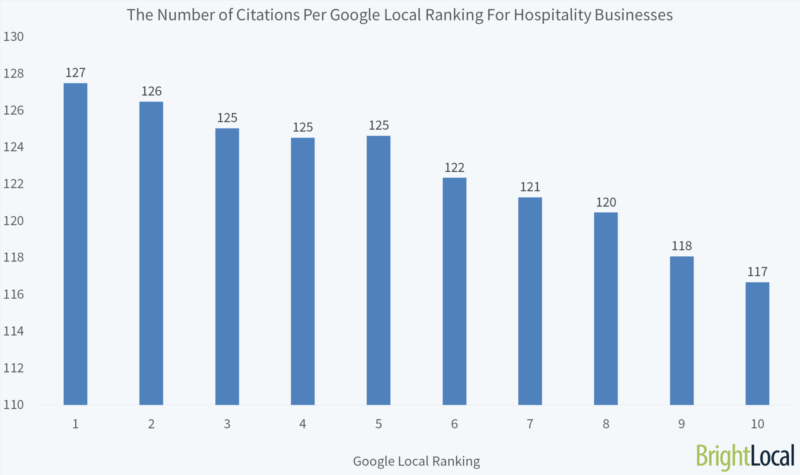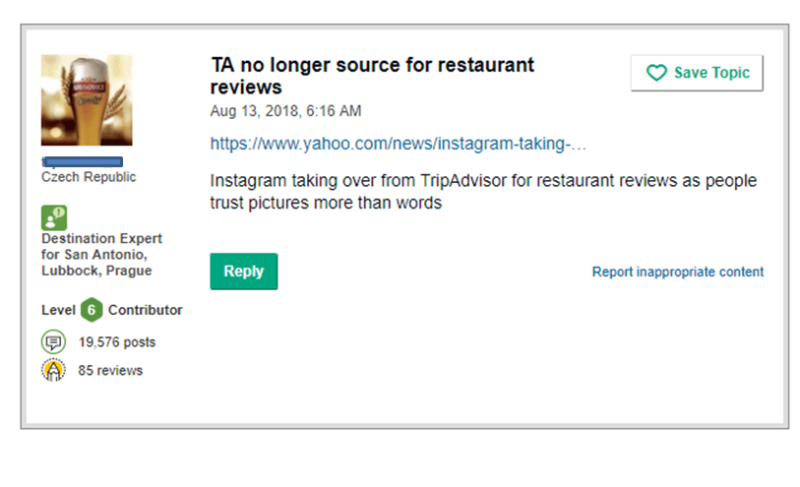How the hospitality industry should approach online reviews and citations
Looking for more positive reviews? Here are some smart ways to build citations and reviews plus tips to boost the visibility of businesses in the hospitality sector.

Potential customers can get almost everything they need to make a purchase decision from Google Maps, Google Reviews, Yelp and other review sites like TripAdvisor for these two industries. This makes working with citations and reviews particularly important for places like restaurants, hotels, B&Bs, pubs, cafés, and bars. Today I’ll be talking about some recent research that highlights just how seriously businesses in this industry take citations and reviews and offering some guidance on how to benchmark your business against competitors and take the lead in this field.
A numbers game
In a recent SEO citations study conducted by BrightLocal (my company), we analyzed citations and local rankings data for over 120,000 local businesses across 26 different industries. In a never-before-seen data slice, we’ve grouped together what we’re calling ‘hospitality’ businesses (hotels, B&Bs, restaurants, cafés, pubs, and hotels)—11,655 businesses in total—and looked at how many citations the businesses ranking top in the local pack have.
We found the average local business in position one has 86 citations. What you see above shows how seriously this industry takes business listings and directories. The average hospitality business in position one has 127 citations (that’s an incredible 48 percent more than the average local business, percentage fans!)
I would by no means attempt to draw causation from these figures, as many other factors can affect local rankings, but there’s a fairly undeniable correlation shown here between how many citations you have and your local pack ranking.
My estimation for this industry, in particular, is the number of citations you have is a strong indicator of how seriously you take your local SEO. Those that build large swathes of citations across the huge amount of food and accommodation directories available will be investing in many other areas including reputation management, local link building, public relations and on-site optimization which lead to higher local pack rankings.
Approach
With so many listings sites available for hotels and restaurants (especially compared to more niche industries like law and medicine), it makes sense that business owners want to be seen in as many online spots as possible. Not only are consistent and numerous citations still considered a small ranking factor, but these types of listings sites are very popular with the public. Your online visibility is impacted by your appearance in them.
But before you go building as many citations as possible for your hospitality business, bear in mind that quality is generally considered more important than quantity. It’s important to make sure the hospitality citations you build are consistent and include as much accurate information for potential customers and search engines alike as possible.
For starters, it’s critical your name, address, phone number and website URL (NAPW) are exactly the same (or as close as possible) across all citations. Incorrect information has been shown to severely impact trust in businesses, particularly those with brick-and-mortar locations so you need to make sure that any change to NAPW is made on every citation you have.
You also need to ensure you don’t just add your business to any old citation site. Relevance is a key local ranking factor so it’s important you limit your participation to relevant sites in your industry or local area. In reality, this advice should apply to every industry, not just hospitality!
Rich business listings
Today, hospitality business listings are no longer solely made up of name, address and phone number (NAP). They can include photography (both by business and customer), consumer reviews, video, menu examples, attributes and much more. As a result, it’s a very good idea to add as much detail as possible into these listings.
In the case of Google My Business (GMB) listings, a large proportion of consumers won’t visit your finely-crafted and expertly optimized website and will make their decision based purely on what they see in your listings. Which is why your GMB listing needs to give the best first impression possible.
You can control some of what’s in the listing. The images you upload, the descriptions you write and the categories you select will all have an impact. But possibly more impactful are the things you can’t control like user-generated photography and consumer reviews. As trust moves away from businesses and into the hands of peers, ensuring your customer experience is excellent so happy customers leave great feedback and photos is now critical.
How to generate and manage reviews
If good reviews are such an important factor to the off and online productivity of a hospitality business, how do you get them? Here are a few tips to get you started on the road to a five-star hospitality business.
1. Genuinely provide an excellent service. No amount of fake reviews or competitor character assassination will reverse the effects of a lousy customer experience. If you’re delivering a shoddy experience, your reviews will reflect that, so don’t start investing time and money in getting customer feedback unless you’re confident that feedback will be positive.
2. It’s okay to ask for reviews, but be careful of where and how. By all means, include links to key review sites in your emails, on postcards and on the premises, but bear in mind that different sites have their own restrictions and they’ll come down hard if you abuse them.
Yelp, for example, doesn’t allow ‘solicited reviews’, and Google’s guidelines state that you can’t only ask people who had a positive experience for a review.
3. Ask for specific words to be included in the review. It’s believed that the inclusion of relevant keywords in reviews can boost your business’ relevance signals and improve local pack rankings, so don’t be afraid to be up-front and ask customers to include certain keywords. How you do this is up to you, though. You could be as bold as saying ‘Please use X word when leaving your reviews’ or as low-key as asking ‘How would you rate our organic coffee?’ or ‘Did you think our dog-friendly restaurant was fun?’
4. Always respond to reviews, even if you think they’re fake. While I’d recommend you get fake reviews removed, you won’t be able to get all of them taken down. Instead of not answering, leave a polite basic reply, that way there will not be blank space where your response should be. Even if it’s simple and non-committal, the fact you’ve left a response shows readers the kind of business they’re dealing with and gives you an opportunity to reveal and boost the personality behind your brand.
5. Make your Instagram handle public and visible. For restaurants, Instagram is superseding TripAdvisor as a source of restaurant reviews, according to top TripAdvisor contributors:
I recommend making your Instagram handle easy to find on the listing. A typical search for a business on Instagram will lead to photos, comments (which sometimes feel more honest than reviews) and happy faces, which you can’t beat for authenticity. And the fact someone’s been willing to share a photo of their experience on Instagram is a tacit endorsement of your business.
Opinions expressed in this article are those of the guest author and not necessarily Search Engine Land. Staff authors are listed here.
Related stories
New on Search Engine Land

